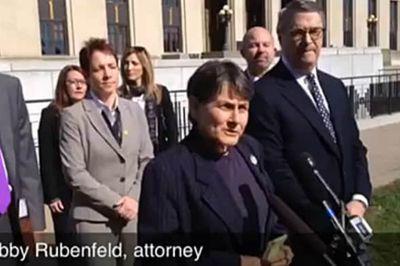In a surprise move, the Supreme Court announced on Monday that it would not review any of the gay marriage cases presented to it. In doing so, the high court confirmed marriage equality immediately in Virginia, Indiana, Wisconsin, Oklahoma, and Utah.
States included in those judicial circuits – North Carolina, South Carolina, West Virginia, Colorado, Kansas, and Wyoming – will also see marriage equality, thanks now to the Supreme Court.
How does this affect Tennessee?
“It doesn’t directly affect our case,” said Abby Rubenfeld, the Nashville-based civil rights attorney who is representing the Tennessee case. “All the Supreme Court said was ‘we’re not gonna deal with this issue right now’ which leaves in effect the decisions in those three circuits, the 4th, the 7th, and the 10th and so the effect of denying review, of not accepting the cases for review, is that the stays in those cases are immediately lifted.”
Earlier the Supreme Court had stayed the decisions of the appeals courts pending its review.
“And what’ll happen over the next several days,” she said, “is that all the states in those circuits that don’t already have marriage equality will also have marriage equality, although in some of the states the state attorneys general are only gonna go down kicking and screaming, but because the highest federal court in their circuit already ruled that it violates the federal constitution, [then] it’s unconstitutional in all those states.”
The Tennessee case is a step behind those cases that the Supreme Court denied review today in that it hasn’t received a ruling from its appeals court, the Sixth Circuit. Exactly two months ago, on August 6, the Sixth Circuit Court of Appeals heard the Tennessee case and we’ve been waiting for a ruling since then. Monday’s action by the Supreme Court has led to further speculation regarding the Sixth Circuit’s intentions.
“It’s really hard to say what’s going on with them. It’s all secret,” said Rubenfeld, referencing the three judge panel that oversaw the Sixth Circuit appeals arguments. “It could be that, if they’re going to rule against us, they don’t want to issue an opinion because they know then the Supreme Court will take it and they know that we’ll all win and they want to delay that, I mean, who knows? It’s all speculation to say stuff like that.”
“If they ruled in favor in only our case,” said Rubenfeld, “it would only affect our three couples, but then we would come back to our trial courts and we would file for summary judgement and ask for the whole statute to be declared unconstitutional. It seems unlikely though that they’re gonna do that. If they rule in favor of marriage equality, it’ll [likely] be for all four states and then, the same as in those other circuits, the highest federal court applicable to these states will have said that these marriage bans violate the United States Constitution and so they won’t be enforceable.”
“And on the other hand,” she added, “if the Sixth Circuit rules against us, our case is set up as the next small step for the Supreme Court to take so it’ll give the Supreme Court various options, so there’s a lot of if’s in terms of our Tennessee case but I think it’s all good.”
“Today's action by the Supreme Court could give the Sixth Circuit pause as they consider their own forthcoming opinion,” said Chris Sanders, the executive director at the Tennessee Equality Project. “Do they want to buck the trend, which they must know would put the issue before the Supreme Court resulting in a decision with implications for all 50 states? I am hearing that the decision may mean that we can expect the Sixth Circuit ruling before the end of October. No one really knows except those three judges.”
“From the listservs I’m on with other lawyers doing these kind of cases,” said Rubenfeld, “I’ve seen all kind of speculation today but nobody knows what it means. It only takes four votes for the Supreme Court to take a case and there’s the four liberals that voted for marriage equality, the four conservatives that voted against it and Justice Kennedy who’s the deciding vote and they couldn’t get four votes, so apparently both sides don’t want to take it right now for whatever reason. Who knows what it means?”
“But the important thing about today is that we just added five more states,” she said. “We added a lot of population and there’s going to be more states as a result of this decision that have marriage equality.”
“It's a great day for equality,” added Sanders, “and it moves us all a little closer to equality. People in East Tennessee will soon be able to cross the border and get married.”
graphic via towleroad
